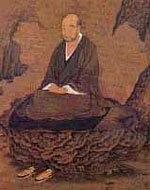Koso Wasan 22
Putting aside his lectures on the four treatises,
He taught Other Power, the working of the Primal Vow;
Guiding foolish beings bound by their blind passions,
He led them to enter the gate to nirvana.
Enter! 'The Common People.'
s
T'an-luan's accomplishments are so varied and vast that it is difficult to select one of them as his most significant contribution to the Buddha Dharma. He introduced the term 'Other Power' to Pure Land discourse and gave us our philosophical basis. Indeed, T'an-luan's theoretical discourse, which is based on Vasubandhu's treatise on the Pure Land, is used to explain many variations on the Pure Land theme. T'an-luan is, then, a powerful figure in the world of the dharma. He looms large and his thought is so penetrating that its power is not diminished even in our own time.
In thinking about what may have been T'an-luan's most important gift of the dharma we ought perhaps ask ourselves some intriguing questions. The first of these is, 'How did T'an-luan become a dharma master in the first place? How did the Buddha Dharma get to China?' The answer to this is that Buddhist missionaries, merchants and monks travelled through the Pamirs (a western reach of the Himalayas) from Kashmir in the south and Samarkand in the west, along the dual routes of the Silk Road and into China. So it was that the oasis towns of central Asia were centres of the dharma for many centuries; light was glowing in these remote places, even as western Europe sank into darkness and barbarity.
We know also from both archæology and the writings of travellers - especially the seventh century Chinese dharma Master Xuanzang - that central Asia was radiant with dharma for many centuries. Monks made their homes in caves in cliffs along remote desert streams - fed by ice thaw from distant ranges - and produced many important commentaries. Their legacy still inspires us today. The Contemplation Sutra is thought by scholars to have been especially cherished in the north-western region of central Asia. It is even possible that there was a version in the Uigur language: the tongue of herdsmen who roamed in the hills that surrounded the north-western bays of Tarim Basin (the Takla Makan Desert) and the Gobi.
In time, the ordinary people of this region found solace and support in Islam, becoming so firece in their love of their new faith that eventually they expelled monastic orders - sometimes ransacking and pilaging their homes and monasteries. When Islam reached China, however, it was too late. For the dharma had become a popular and geatly loved faith - a genuine refuge for ordinary men and women. It is to many Chinese dharma masters that we owe thanks for this fact but, perhaps, most of all to T'an-luan. T'an-luan showed that the principal focus of the dharma was the blind and the lost, the busy - and those who could not live an exemplary life. Although this was clearly latent in the Buddhist teaching, it was T'an-luan who made it clear.
The remarkable thing about T'an-luan was that he knew nothing of Islam or even of Nestorian Christianity, which had probably become indistinguishable from Taoism by his time, anyway. His insights were not an artificial attempt to 'make the dharma relevant' by responding to challenges from other religions. T'an-luan lived in a time during which the dharma was secure and flourishing - unlike Tao-ch'o who followed him a generation or two later. Why then did T'an-luan respond so compassionately to the spiritual needs of ordinary people?
My view is that T'an-luan brought the dharma back into life purely as an agent of Amida Buddha. I say this because, if the dire things which befell the dharma in the west during the centuries after T'an-luan had encountered similar circumstances in China, then the dharma would now be completely extinct - following its fate in central Asia.
T'an-luan's most important contribution, then, was to show - in his exegesis of the dharma - that the primary concern of the Buddha is ordinary people (bombu, Sk. prthagjana). He reminded the sangha of its real vocation: the salvation of 'common people, bound by their evil passions'.